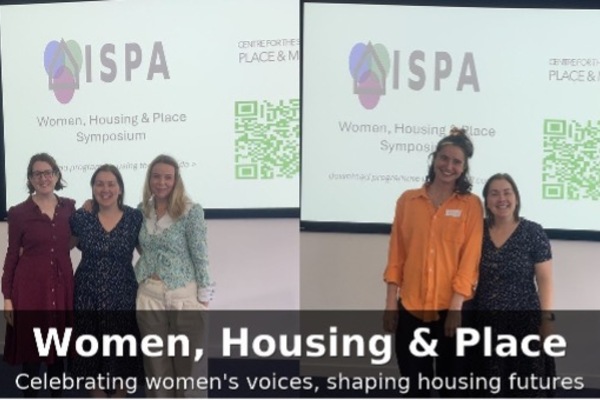In August 2020, Kim McKee (University of Stirling), Craig Gurney (University of Glasgow) and Jenny Hoolachan (Cardiff University) hosted the second HSA/HSCT seminar on the subject of tenure. Here, they provide an overview of the two-day virtual event.
Introduction
This seminar was the second in a series of events funded jointly by the Housing Studies Association and the Housing Studies Charitable Trust. The funding call was influenced by a paper Alan Murie wrote for the HSA website: Building on what we know -the fault lines for housing research. The aim of our seminar series was to promote discussion and debate between academics and practitioners around the continued utility of tenure as a concept, and how our understanding and use of it might be rethought. A very successful event was held in Cardiff in December 2019, with the planned follow-up event due to be hosted by the University of Stirling having to make the move online due to Covid-19.
Creating Online Conversations
Spread over two days, the online seminar was organised into four sessions, half of which were delivered live and the other half pre-recorded. The focus was very much on discussion and debate with all presentations kept short. This structure worked well. It was less intensive than a wholly live event and was also very effective in promoting a flat hierarchy and encouraging engaging and dynamic discussion. Each session had a named discussant who opened up the proceedings and kick-started the questions. The use of real-time chat also allowed us to gather lots of questions for our presenters; to exchange ideas and reading resources; and to link the threads of ideas within and between sessions. Virtual social events pepper-potted throughout the two days enabled connections to be made with colleagues new and old and it presented us with an opportunity to include colleagues from outside of the UK, namely the Netherlands, which may not otherwise have been possible had the event taken place in person as originally planned.
A competition was held to support Early Career researchers (ECRs) to attend, with delegate places being awarded to Kieran Green (Plymouth University) and Olimpia Mosteanu (independent researcher). The full delegate list for this event was:
Moira Bayne (Housing Options Scotland), Emma Bimpson (Sheffield Hallam University), Christian Fang (Utrecht University), Lisa Garnham (Glasgow Centre for Population Health), Kieran Green (Plymouth University), Jolien Groot (University of Amsterdam), Craig Gurney (University of Glasgow), Jenny Hoolachan (Cardiff University), Tony Manzi (Sheffield Hallam University), Vikki McCall (University of Stirling), Zhan McIntyre (Bield Housing Association), Kim McKee (University of Stirling), Tom Moore (University of Liverpool), Olimpia Mosteanu (independent researcher), Anna Pearce (University of St Andrews), Richard Ronald (University of Amsterdam), Tom Simcock (Edgehill University), Alasdair Stewart (University of Glasgow) and Peter Williams (consultant).
The event was committed to involving housing colleagues at all career stages and we had ECRs as presenters, sessions chairs and discussants. Some delegates were able to attend both the Cardiff and Stirling events, which allowed cross-fertilisation of ideas across the seminars. Some further blogs will follow shortly from some of our ECR delegates.
Reflections from Seminar 2
Delegates rose to the challenge of bringing our event to life online, and everyone welcomed the opportunity to come together and engage in debate around housing topics they were knowledgeable and passionate about:
Session 1: Blurring the Boundary, opened with live presentations from Peter Williams and Tony Manzi. Key themes of discussion were around fragmentation and diversification within tenure categories, but also the potential for tenure to create both symbolic and social boundaries, and potentially to act as a discourse in and of itself. The impact of Covid-19 on the geography of the housing market also generated much interest and debate, with questions also posed about the need for further scrutiny of mortgage/credit lenders.
Session 2: Social Responsibility in the PRS, hosted pre-recorded presentations from Emma Bimpson and Lisa Garnham (co-written with Steve Rolfe). This session generated lots of debate about the potential for private landlords to adopt a more social, person-centred service, but also how we think about and categorise vulnerability. The importance of relationships came through very strongly in this session, and there was also much debate about the links between tenure, the home and the neighbourhood.
Session 3: Tenure Diversification and Diversity, hosted pre-recorded presentations from ECR delegates Anna Pearce, Christian Fang and Jolien Groot. This session highlighted how housing researchers may be too reductionist in focusing on large tenure categories. These presentations very effectively highlighted diversity of experience, the recent emergence of more flexible forms of housing and tenancies, and the way in which some housing categories are often forgotten about all together (asylum seekers accommodation). Themes of discrimination, exclusion and moral judgement came through strongly, as well as the impacts this has on mental health.
Session 4: Policy and Practice Reflections, closed the event by connecting the discussion back to policy and practice. A key theme emerging was the need to move beyond tenure and think about housing as a human right. A key point emphasised by both Zhan McIntyre and Moira Bayne was the importance of focusing on housing need. Not least as not all homeownership, social or private rented properties are created equal; rather, there is huge diversity within these tenure categories, with differential access depending on household circumstances. With the emergence of new housing options in recent years, such as Mid-Market Rent and various Low-Cost Homeownership products, the need for housing education to enable people to make more informed choices was also emphasised.
This two-day event encouraged a lot of reflection as to whether housing researchers are guilty of fetishising tenure. Yet at the same time it was acknowledged that tenure has utility as a proxy for other things (see for example, Hiscock et al., 2001). After much discussion of these issues over the course of the two events it would seem difficult to disagree with Murie’s (2019) original contention that tenure may no longer “reflect key fault lines” in housing and society in the way it once did. Just as housing tenure structures have changed, so too must the conceptual tools of housing researchers studying it. These series of events have sought to encourage reflection and further thinking on this critical issue for housing studies.
References
Hiscock, R.; Kearns, A.; MacIntyre, S. and Ellaway, A. (2001) “Ontological Security and Psycho-Social Benefits from the Home: Qualitative Evidence on Issues of Tenure” Housing, Theory and Society, 18:1-2, 50-66.
Murie, A. (2019) “Building on what we know: fault lines for housing research”, Blog for Housing Studies Association, 19 March 2019: https://www.housing-studies-association.org/articles/144-building-on-what-we-know-fault-lines-for-housing-research






